新版新目标英语八年级上册知识点总结
新目标八年级英语上册知识点总结-新目标[整理]
![新目标八年级英语上册知识点总结-新目标[整理]](https://img.taocdn.com/s3/m/5f965cc6c8d376eeaeaa31db.png)
新目标八年级英语上册语法复习1) leave的用法1.“leave+地点”表示“离开某地”。
例如: When did you leave Shanghai? 你什么时候离开上海的?2.“leave for+地点”表示“动身去某地”。
例如: Next Friday, Alice is leaving for London. 下周五,爱丽斯要去伦敦了。
3.“leave+地点+for+地点”表示“离开某地去某地”。
例如: Why are you leaving Shanghai for Beijing? 你为什么要离开上海去北京?2) 情态动词should“应该”学会使用 should作为情态动词用,常常表示意外、惊奇、不能理解等,有“竟会”的意思,例如: How should I know? 我怎么知道?Why should you be so late today? 你今天为什么来得这么晚? should有时表示应当做或发生的事,例如: We should help each other.我们应当互相帮助。
我们在使用时要注意以下几点:1.用于表示“应该”或“不应该”的概念。
此时常指长辈教导或责备晚辈。
例如: You should be here with clean hands. 你应该把手洗干净了再来。
2. 用于提出意见劝导别人。
例如: You should go to the doctor if you feel ill.如果你感觉不舒服,你最好去看医生。
3. 用于表示可能性。
should的这一用法是考试中常常出现的考点之一。
例如: We should arrive by supper time. 我们在晚饭前就能到了。
She should be here any moment. 她随时都可能来。
3) What...? 与 Which...? 1. what 与 which 都是疑问代词,都可以指人或事物,但是what仅用来询问职业。
人教版新目标八年级英语上册1、2、3、4单元知识点总结材料

新目标八年级英语上册第一单元Unit 1.How often do you exercise?I. 重点短语归纳:on weekends 在周末1. go to the movies 去看电影2. look after=take care of 照顾、照看3. surf the internet 上网4. healthy lifestyle 健康的生活方式5. go skateboarding 去滑滑板watch TV看电视6. keep healthy=stay healthy = keep in good health 保持健康keep + 形容词表保持某种状态do some reading 阅读7. exercise= take/do (much) exercise=do sports锻炼8. eating habits 饮食习惯9. take more exercise 做更多的运动10. the same as 与什么相同11. once a month一月一次12. be different from 不同13. twice a week一周两次.three times a week一周三次14. make a difference to 对什么有影响As teachers, you must believe that you can make a difference to the li ves of your students. 身为教师,你们必须坚信你们能够影响学生的一生。
A false step will make a great difference to my future.错走一步对我的前程来说会产生很大影响。
15.how often 多久一次,询问动作发生的频率一般用once a week ,twice a month ,every day ,sometimes等回答。
人教版新目标八年级上册英语全册1-10单元重点短语词组总结汇编

人教版新目标八年级上册英语1-10单元重点短语词组总结汇编Unit1 Where did you go on vacation?(1)decide to go(to someplace) 决定去(某地)decide to do something 决定做某事make a decision 做决定,下决心(2)have a good time 玩得愉快have a wonderful time 玩得开心/痛快(=have fun/enjoy oneself)(3)the top of the mountain 山顶(4)stay at home 待在家里(5)go to the mountains 去山里go to the beach 去海边go to summer camp 参加夏令营(6)visit my uncle 拜访我的叔叔visit museums 参观博物馆(7)feel like 感受到,给人……的感觉(8)quite a few 相当多,不少(9)of course 当然(10)because of 由于,因为(11)try to do something努力/尽力/试图做某事try doing something试着做某事have a try 尝试一下(此处try为n.)(12)dislike somebody/something 厌恶/不喜欢某人/某物(13)be/get bored with 对……厌倦(14)have a great difference in…在……方面存在很大差异make a difference 有影响,有转折,创造不同/有所成就be different from…与……不同(15)by oneself 某人独自(= on one's own)Unit2 How often do you exercise?(1)at least 至少,不少于,起码at most 至多,最多,不超过(2)such as 例如(3)more than 多于less than少于(4)use the Internet 使用网络(5)watch television/TV看电视(6)read English books 看英语书籍(7)go online 上网go shopping 去购物(8)eat vegetables and fruit 吃水果和蔬菜(9)most of the time 大部分时间(10)stay up late 熬夜, 晚睡(=burn the midnight oil)(11)healthy habits健康的习惯(12)Old habits die hard旧习难改(13)do housework 做家务help with housework 帮忙做家务do homework 做家庭作业(14)junk food垃圾食品fast food快餐,速食instant noodles方便面instant coffee速溶咖啡(15)hardly ever 几乎从不(16)once a day一天一次once a week一周一次once a year一年一次once again再次(17)twice a day一天两次twice a week一周两次twice a year一年两次once or twice一两次,偶尔(18)be full of sth. (有)大量的,丰富的(=be filled with sth.)(19)a full bottle of wine一满瓶葡萄酒a full day of…一整天的……a full life一个经历丰富的人生the full story全部情况(20)swing dance摇摆舞(21)be good for one’s health对某人身体健康好be bad for one’s health 对某人身体健康有害(22)keep healthy 保持健康stay healthy 保持健康healthy lifestyle健康的生活方式healthy food有益健康的食物(23)one/a hundred percent百分百one percent 百分之一fifty percent百分之五十one percent of students…百分之一的学生……how many percent of the students…? 百分之几/多少的学生……?(24)常见的频度副词排序(程度从高到底)如下:always 总是100%almost always 几乎总是90%usually 通常80%often 经常60%sometimes 有时40%seldom 很少20%hardly ever 几乎不曾5%almost never 几乎从不 2%never 从不0%(25)how often…? 问频率,意为“多久一次”how soon…? 问将来,意为“多久以后”how long…? 问时间段,意为“多久”,“多长时间”(26)sometimes是副词,意为“有时”,常用于一般现在时,表示频率some times意为“几次;几倍”sometime意为“某时”,可用于过去时或将来时some time意为“一段时间”(27)be good for对……有益be good at 擅长……be good to 对……友善Unit3 I’m more outgoing than my sister.(1)care about 关心,在意care for 关心,照顾,喜欢(2)be different from 与……不同/有差异(3)bring out 使呈现,使表现出(4)the same as 和……相同/一致(5)in fact 事实上,实际上(6)be similar to 与……相似的(7)primary school 小学(8)be talented in在……方面有天赋(9)do the same things 做同样的事情(10)be good at sports 擅长运动(11)make sb. laugh让某人笑laugh at sb.嘲笑/取笑某人laugh with sb.与某人同声笑laugh loudly 大声笑(12)be quiet/keep quiet 保持安静(13)win a competition赢得一场比赛competition and cooperation 竞争与合作(14)true or false 是非,正误(15)be serious about 对……是认真的take it seriously 认真对待(16)It is (not)necessary to do sth. (没)有必要做某事(17)touch my heart触动我的心灵in touch with 和……有接触/有联系get in touch 取得联系keep in touch with 与……保持联系(18)break one’s arm摔断了胳膊break the rule违反规则(19)share…with sb.与某人分享某物lion’s share 最大的份额(20)collect information 收集信息get information 得到信息receive information 收到信息provide information提供信息a piece of information 一条消息(21)“the+比较级,the+比较级”表示“越……,就越……”The more, the better. 越多越好Unit4 What’s the best movie theater?(1)(be) close to 离……近(=next to)close friends 密友(=bosom friends知心朋友)a close game势均力敌的比赛(2)big screens 大屏幕(3)think about/ of 思考,考虑(4)do a survey of 做……的调查(5)as for 至于(6)win the prize for 获得……奖(7)the worst service 最差的服务(8)the cheapest price 最便宜的价格(9)in the south of China 在中国南部(10)talent show 才艺表演(11)have ...in common 有相同特征(12)all kinds of 各种各样的(13)be up to 是……的职责(14)play a role in…在……中发挥作用(=play a part in…)(15)make up 编造,化妆,组成(16)for example 例如(17)唱快歌sing fast songs(18)take ...seriously 认真对待……(19)come true 实现(20)be careful of 当心,小心(21)look for 寻找(强调动作)find 找到(强调结果)(22)act as 作为,担当,充当(23)How do/does sb. like ...? 意为“某人认为……怎么样?”(=“What do/does sb. think of...?”或“What do/does sb. think about ...?”)(24)so far 到目前为止,迄今为止(= till now)Unit5 Do you want to watch a game show?(1)action movie 动作片(2)find out 查明,弄清(3)take sb’s place 代替,替换(=take the place of sb.)(4)be ready to do sth. 愿意做某事get ready for 为……做准备,强调动作be ready for 为……做好了准备,强调状态get sth. ready 把某物准备好(5)do a good job干得好(6)dress up 装扮,乔装打扮dress up (in) 穿上……盛装,用……装饰dress up as sb/sth. 装扮成某人或某物(7)talk show 脱口秀(8)talent show 才艺表演(9)can’t stand 受不了,不能忍受(10)soap opera肥皂剧(11)plan to do sth. 计划去做某事make a plan/plans 制定计划(12)sth.+happens/happened +to+sb. 某人发生某事sb. Happens/happened to do sth. 某人碰巧做某事(13)happen 偶然发生(无被动形式)take place 有计划发生(无被动形式)(14)expect (sb.) to do sth. 期望(某人)去做某事be expected to do sth. 被期望去做某事(15)be famous for... 因......而著名be famous as... 作为......而出名(16)good luck to sb. 祝某人好运bad luck 倒霉,坏运气(17)stand against 反对stand for 代表,表示stand out 突出;显著(18)appear to do sth. 似乎在做某事(19)succeed in doing sth. 成功做某事(be successful in doing sth.)(20)common names 常见的名字common mistakes 常犯的错误common sense 常识common interest 共同的兴趣common language 共同语言common market共同市场(21)an ordinary worker 一个普通工人ordinary-looking 相貌平常的(22)normal temperature 正常体温normal state 正常状态(24)hope for sth. 希望得到某物hope to do sth. 希望做某事(25)wish sb. sth. 希望某人有某物wish to do sth. 希望做某事wish sb. to do sth. 希望某人做某事(hope没有这种用法)Unit6 I’m going to study computer science(1)write down 写下,记下(2)have to do with 关于,与……有关系have nothing to do with…与……无关(3)take up 学着做,开始做;占据,占用(4)agree with 同意,赞成(后面接表示人或表示“意见,观点”的词)agree to 赞同,同意(后面接表示计划,提议,办法,安排等词,to是介词)(5)personal improvement 自我改进(6)make promises 许诺give a promise 许下诺言keep a promise 信守诺言(=keep one’s word)carry out a promise 履行诺言break a promise 违背诺言promise to do sth. 答应/许诺做某事(7)have something in common 有共同点(8)improve relationships 改善关系(9)at the beginning 在……开始(10)for this reason因为这个原因(11)send for 派人去叫send away 派遣,解雇send off 送别,差遣send up 发射(12)make a resolution做决定,下决心(13)make sure(of)确信(=be sure)(14)discuss sth. with sb. 和某人谈论某事(15)grow up 成长,长大grow into 长大成为(16)be going to do sth. 打算,准备,计划做某事(将来时)(17)make a plan for…为……制定计划(18)a kind of 一种all kinds of 各种各样的kind of 有点(= a little)Unit7 Will people have robots? (1)space station太空站(2)over and over again 多次,反复地(3)hundreds of 数以百计,许多,大量(4)be able to do sth. 能够做某事be unable to do sth. 不能做某事(5)fall down 倒下,跌倒,倒塌fall asleep入睡fall behind落后于(某人或某物)fall in love with喜爱,爱上fall off 掉下fall over 跌落,被绊倒fall into落入,陷入A fall into the pit, a gain in the wit. 吃一堑,长一智(此处fall为n. 跌落)(6)look for寻找(强调动作)(7)play a part in sth.参与某事(= play a role in sth.)play a part in doing sth. 参与做某事(8)in 100 years 一百年以后(9)help with the housework帮忙做家务(10)seem impossible好像不可能(11)make robots look like humans使机器人看起来和人类一样(12)for example例如(13)have many different shapes有很多不同的外形(14)air/water pollution 空气/水污染noise pollution 噪音污染environmental pollution “环境污染(15)believe sb. 相信某人说的话believe in sb. 信任某人,相信某人的人格(16)be free to do sth. 自由地做某事(17)try sth. 尝试某事try to do sth. 尽力做某事try doing sth. 试着做某事try one’s best to do sth. 尽某人最大努力做某事(= do one’s best to do sth.)try on试穿try out 试用,试验have a try 试一试(18)look like看起来像……(应用范围最广,除了描述人、物之外,也能抽象表达事件或现象)take after像……,与……相似(最常见的是用在有血缘关系的亲子之间,外貌用的最多,也能够用在性格脾气这些内在特质上)be similar to 与……相似(一般用在相近似的物品和情境的对比上)Unit8 How do you make a banana milk shake?(1)p our…into …把……倒进……里(通常强调倾倒液体)put…into…把……放进……里(既可以放液体,也可以放固体)pour out 倒出(2)t urn on 接通,打开(电源开关)turn off 关闭,熄灭(灯、煤气等)turn up (把音量)调大,调高turn down (把音量)调小,调低turn in 上交turn into使成为;翻译成turn to转向turn over翻转(3)cut up 切碎(4)mix up混合在一起(5)peel the bananas 剥香蕉(6)a cup of yogurt 一杯酸奶(7)five spoons of honey 五勺蜂蜜(8)add…to…把……加到……add to增加;增添(其中to是介词,后接名词或代词)add up 把……加起来add up to 总计,加起来结果是(9)celebrate with 用......庆祝(10)a piece of art一件艺术品a piece of一张,一片,一件,一条in pieces 碎片,碎块(11)cover…with…用......覆盖be covered with 被……覆盖(12)at first 起初,首先from first to last自始至终first of all 首先,第一(13)be filled with 充满......(= be full of)(14)put away把……收起来放好put on穿上put off推迟,延期put out熄灭put down放下put up建造;挂起;举起put…on…把……放在……上put together 放在一起(15)sth. needs doing 某物/事需要被做=sth. needs to be done(16)have a big meal 吃大餐(17)it’s time to do sth 到/是做某事的时候了(=it’s time for doing sth/ sth)(18)make sb. sth. = make sth. for sb. 为某人做某物Unit9 Can you come to my party?(1)prepare sth. 准备......prepare to do sth. 准备做某事prepare for an exam 为考试做准备prepare for (doing)sth. 为某事做准备prepare sth. for... 为……准备某物make preparations for 做准备(2)hang out闲逛,徘徊,逗留(=hang about)hang up挂断(电话)hang on不挂断(3)take a trip 去旅行(4)reply to(sb./sth.) 对......作出回答或答复reply for 致答辞;谢辞a reply to... 对......的答复in reply (to) 作为(对……的) 答复,为答复……(5)hear from sb. 收到某人来信(6)the day after tomorrow后天(7)another time 别的时间(8)look forward to 盼望,期待(9)turn down 拒绝(10)the day before yesterday前天(11)have the flu 患流感(12)go to the doctor 看医生(13)come to the party来参加聚会(14)meet friends见朋友(16)have to 不得不(16)invite sb to do 邀请某人做某事invite sb to someplace 邀某人去某地invite sb. for a drink 请某人喝酒(17)refuse sb. 拒绝某人refuse (sb.) to do 拒绝某人去做某事refuse sb. sth.为某事拒绝某人(作为及物动词)(18)catch one's breath 喘气,吓一跳,(由惊吓)暂时停止呼吸catch out 发觉某人的过失/错误,找破绽catch up with赶上(19)to one’s surprise 使某人吃惊的是……in surprise 吃惊地be surprised at/about 对……感到吃惊/意外(20)too much强调much,修饰不可数名词much too强调too,修饰形容词或副词(21)thanks for…为……而感谢,后接名词、代词或动名词thanks to 幸亏,由于thank sb. for sth. 为某事感谢某人be thankful to sb. for sth. 因某事而对某人心存感激(22)be busy doing sth. 忙于做某事be busy with sth. 忙于……(23)call sb. 给某人打电话(=ring sb.phone sb.ring sb. upgive sb. a callgive sb. a ringmake a phone call to sb.)(24)look forward to期待,盼望(to是介词,后面接名词,代词或动名词作宾语)(25)not…until…直到……才(26)have to 客观上不得不must主观上必须(27)can’t help doing sth 禁不住做某事help oneself to 随便用……with the help of =with one’s help在……的帮助下help sb. out 帮助某人摆脱困境help sb.(to)do sth. 帮助某人做某事Unit10 If you go to the party, you’ll have a great time! (1)keep…to oneself保守秘密;不与人来往,不交际keep doing sth. 继续做某事,保持某种状态(2)in the end/at last 最后,终于(3)make a mistake/make mistakes 犯错误by mistake错误地(不是故意做某事)(4)too…to…太……而不能……(5)advise sb. (not)to do sth. 建议某人(不)做某事(6)be angry with sb. 生某人的气be / get angry at / about sth. 因某事而生气(7)cut...in half 把……切成两半/一切为二be halfway to …完成了或做了事情的一部分(此处to是介词)(8)have lots of worries 有很多烦恼(9)the first step to do sth. 做某事的第一步(10)ask for advice 寻求建议a piece of advice一条建议give sb. advice (on) 给……提(有关……)的建议take one’s advice 听从某人的建议(11)have problems with…在……某方面有问题(12)run away from 逃离(13)solve (=deal with)problems 解决问题(14)go to the party 参加聚会go fishing 去钓鱼(15)be upset with sb. 生某人的气upset oneself 使某人自己心烦气乱(16)do enough exercise 做足够的运动(17)cook/make dinner/supper 做晚饭(18)have lots of money 有很多钱(19)eat too much 吃得太多(20)help others 帮助别人(21)a great soccer player 一个伟大的足球运动员(22)travel around the world 周游世界(23)have / be an experience有/是一次经历be experienced in 在……方面有经验have no experience at all 完全没有经验rich experience 丰富的经验practical experience 实务经验,实践经验(24)in the end 最后,终于(=at last,finally)by the end of到……为止,在……以前at the end of在……末尾,在……尽头(25)be afraid of/to do sth. 害怕做某事,不敢做某事(此外be afraid of还可以表示担心可能会发生某事)(26)worry about /over sth/sb担心某事/某人worry about=be worried about 担心(27)ask sb. to do sth. 请求/要求某人做某事其否定形式为ask sb. not to do sth.第21 页共21 页。
人教版新目标英语八年级上册各单元知识点总结梳理归纳汇总
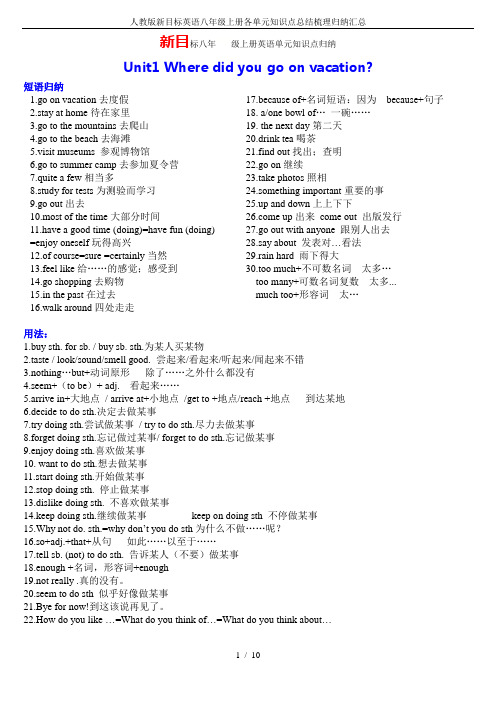
人教版新目标英语八年级上册各单元知识点总结梳理归纳汇总新目标八年级上册英语单元知识点归纳Unit1 Where did you go on vacation? 短语归纳1.go on vacation去度假2.stay at home待在家里3.go to the mountains去爬山4.go to the beach去海滩5.visit museums 参观博物馆6.go to summer camp去参加夏令营7.quite a few相当多8.study for tests为测验而学习9.go out出去10.most of the time大部分时间11.have a good time (doing)=have fun (doing) =enjoy oneself玩得高兴12.of course=sure =certainly当然13.feel like给……的感觉;感受到14.go shopping去购物15.in the past在过去16.walk around四处走走17.because of+名词短语:因为because+句子18. a/one bowl of…一碗……19. the next day第二天20.drink tea喝茶21.find out找出;查明22.go on继续23.take photos照相24.something important重要的事25.up and down上上下下e up出来come out 出版发行27.go out with anyone 跟别人出去28.say about 发表对…看法29.rain hard 雨下得大30.too much+不可数名词太多…too many+可数名词复数太多...much too+形容词太…用法:1.buy sth. for sb. / buy sb. sth.为某人买某物2.taste / look/sound/smell good. 尝起来/看起来/听起来/闻起来不错3.nothing…but+动词原形除了……之外什么都没有4.seem+(to be)+ adj. 看起来……5.arrive in+大地点/ arrive at+小地点/get to +地点/reach +地点到达某地6.decide to do sth.决定去做某事7.try doing sth.尝试做某事/ try to do sth.尽力去做某事8.forget doing sth.忘记做过某事/ forget to do sth.忘记做某事9.enjoy doing sth.喜欢做某事10. want to do sth.想去做某事11.start doing sth.开始做某事12.stop doing sth. 停止做某事13.dislike doing sth. 不喜欢做某事14.keep doing sth.继续做某事keep on doing sth 不停做某事15.Why not do. sth.=why don’t you do sth为什么不做……呢?16.so+adj.+that+从句如此……以至于……17.tell sb. (not) to do sth. 告诉某人(不要)做某事18.enough +名词,形容词+enough19.not really .真的没有。
新目标八年级英语上册知识点总结-新目标[整理]
![新目标八年级英语上册知识点总结-新目标[整理]](https://img.taocdn.com/s3/m/ff9d8371168884868762d688.png)
新目标八年级英语上册语法复习1) leave的用法1.“leave+地点”表示“离开某地”。
例如:When did you leave Shanghai?你什么时候离开上海的?2.“leave for+地点”表示“动身去某地”。
例如:Next Friday, Alice is leaving for London.下周五,爱丽斯要去伦敦了。
3.“leave+地点+for+地点”表示“离开某地去某地”。
例如:Why are you leaving Shanghai for Beijing?你为什么要离开上海去北京?2) 情态动词should“应该”学会使用should作为情态动词用,常常表示意外、惊奇、不能理解等,有“竟会”的意思,例如:How should I know? 我怎么知道?Why should you be so late today? 你今天为什么来得这么晚?should有时表示应当做或发生的事,例如:We should help each other.我们应当互相帮助。
我们在使用时要注意以下几点:1.用于表示“应该”或“不应该”的概念。
此时常指长辈教导或责备晚辈。
例如:You should be here with clean hands. 你应该把手洗干净了再来。
2. 用于提出意见劝导别人。
例如:You should go to the doctor if you feel ill.如果你感觉不舒服,你最好去看医生。
3. 用于表示可能性。
should的这一用法是考试中常常出现的考点之一。
例如:We should arrive by supper time. 我们在晚饭前就能到了。
She should be here any moment. 她随时都可能来。
3) What...? 与Which...?1. what 与 which 都是疑问代词,都可以指人或事物,但是what仅用来询问职业。
人教新目标八年级英语上册重难点知识点归纳
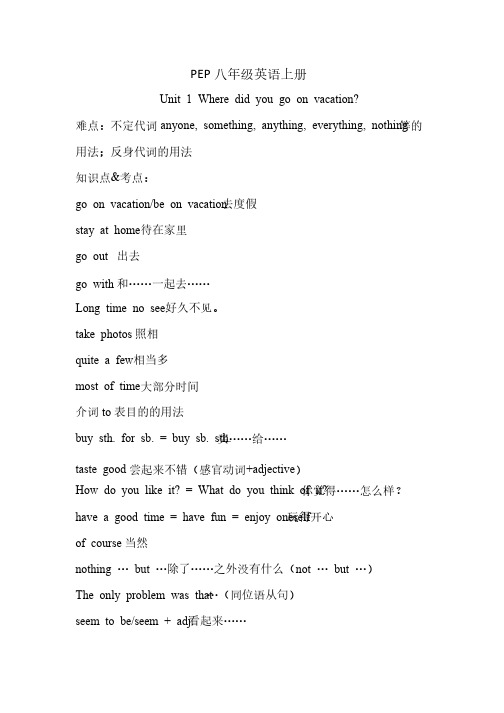
PEP八年级英语上册八年级英语上册Unit 1 Where did you go on vacation? 难点:不定代词anyone, something, anything, everything, nothing等的用法;反身代词的用法用法;反身代词的用法知识点&考点:考点:go on vacation/be on vacation 去度假去度假stay at home 待在家里待在家里待在家里go out 出去出去go with 和……一起去……和……一起去……Long time no see. 好久不见。
好久不见。
take photos 照相照相quite a few 相当多相当多相当多most of time 大部分时间大部分时间大部分时间表目的的用法介词to表目的的用法buy sth. for sb. = buy sb. sth. 买……给……买……给……taste good 尝起来不错(感官动词+adjective)How do you like it? = What do you think of it? 你觉得……怎么样?你觉得……怎么样?have a good time = have fun = enjoy oneself玩得开心玩得开心of course 当然当然nothing …but …除了……之外没有什么(not …but …)…)The only problem was that …(同位语从句)…(同位语从句)seem to be/seem + adj. 看起来……看起来……keep a diary 记日记记日记记日记 + at + 小地点小地点小地点arrive + in + 大地点大地点大地点 decide to do 决定做某事决定做某事决定做某事 try doing sth. 尝试做某事尝试做某事尝试做某事 try to do sth. 尽力做某事尽力做某事feel like 感觉到感觉到 feel like + n./ v-ing 想要……想要……ride … to …骑……到………骑……到……许多的:a lot of + 可数名词可数名词 lots of + 可数可数or 不可数名词不可数名词 I wonder that …我想知道………我想知道………我想知道…… in the past 在过去在过去在过去 enjoy doing sth. 享受做某事享受做某事享受做某事 walk around 到处逛逛到处逛逛感叹句:What + 冠词冠词 + adj. + n. + (it is) = How + adj. + 冠词冠词 + n. + (it is) start start doing doing doing sth. sth. 开始做某事开始做某事 stop stop doing doing doing sth. sth. 停止做某事停止做某事 finish finish doing doing sth. 结束做某事结束做某事because & so (不可同用)(不可同用)(不可同用) wait for …等待………等待……because of + n. a little/ a few 一些(两者的区别,以及与little/few 的区别)的区别) enough + n. / adj. + enough as + adj./adv. + as 和……一样……和……一样……one bowl of …一碗………一碗……along the way 沿着这条路沿着这条路沿着这条路 时间段+ later = after + 时间段……之后时间段……之后other, others, the other, the others, another on trip 在旅途中在旅途中find out 找到,找出找到,找出 / find 寻找寻找 / look for 寻找寻找寻找 so + adj. + that + 从句如此……以致……从句如此……以致……tell sb. (not) to do sth. 告诉某人(不要)做某事告诉某人(不要)做某事keep doing sth. / go on doing sth. 继续做某事继续做某事keep sth. + adj. 使……保持……状态使……保持……状态up and down (人)来来往往;(人)来来往往;(物)上上下下(物)上上下下in excitement = excitedly 兴奋地兴奋地come up / come out / come on / come in forget to do sth. 忘记做某事忘记做某事 forget doing sth. 忘记做过某事忘记做过某事忘记做过某事 like / dislike + n. / v-ing 喜欢/不喜欢某物/做某事做某事something + adj. ……的事情……的事情……的事情 Why not + v. = Why don ’t you + v. 为什么不……呢?为什么不……呢?Unit 2 How often do you exercise? 重点:1. How often 句型的运用;2. 2. 六个频度副词六个频度副词never, hardly ever, sometimes, sometimes, often, often, often, usually, usually, usually, always always 的差异、理解及使用;3. 频率数词once, twice 等的认识和运用;4. 一般现在时不同人称谓语形式的变化及一般疑问句的问答。
新人教新目标版八年级英语上册短语语法知识点汇总

人教版八年级英语上册短语语法知识点总结初二英语课组2019年[由我校初二英语科组根据最新考纲和近几年中考的趋势加上我校学生的实际情况,结合初二全体英语科组的力量,汇编了这一份重点总结,编好一份学案不易,望同学们能好好利用。
]Unit 1 Where did you go on vacation一、必背单词短语。
Section A1.Where did you go on vacation? (P. 1)on vacation意为“在度假”,结构“on+名词”表示“在某种状态中”。
例句:My family went to Hainan on vacation last year.2....visited my uncle (P. 1)visit此处用作及物动词,后接人或物做宾语,意为“拜访、看望”,后接表示地点的名词,意为“参观、游览”。
例句:I visited my grandmother last week.例句:Do you want to visit Shanghai?3....go with anyone? (P. 2)(1)anyone用作不定代词,意为“有人、任何人”,相当于anybody,用于疑问句和否定句中,在肯定句中用someone或者somebody。
但是anyone也可以用在肯定句中,表示“任何一个人”。
例句:Did you meet anyone friendly in that city?例句:Anyone can be helpful in some way.(2)anyone只能指人,不可以指物,后面不接of短语;any one既可以指人也可以指物,后可接of短语。
例句:You can ask any one of us about this question.4....buy anything special? (P. 2)(1)buy用作双宾语动词,表示“买”,常用的结构为“buy sb. sth.”或者“buy sth. for sb.”,表示“为某人买某物”。
(人教版新目标)八年级英语上册全册各单元知识点期末总复习讲解教学课件

3. feel like “感受到;摸起来”,后跟宾语 从句或名词。 I felt like I was a bird. 我感觉我是一只鸟。 It feels like a stone. 它摸起来像一块石头。
eg.something special; somewhere wonderful. 2.不定代词做主语时,谓语动词用第三人称单数。 eg.Is everybody here? 大家都到齐了吗?
1. get to/reach/arrive 都是“到达“的意思。
get to+sp=reach+sp = arrive at+sp(小)=arrive in+sp(大) 若他们后面要加地点副词here, there, home等,则 不需要加介词。
25、up and down上上下下 26、come up出来 27、enjoy oneself=have fun=have a good time
玩的开心
二、重要句子(语法):
1.Where did you go on vacation? 你到哪里去度假了?
I went to New York City. 我去了纽约城。
三、习惯用法、搭配
1. buy sth. for ab./ buy sb. sth. 为某人买某物 2. taste + adj. 尝起来…… 3. nothing to do but do除了……之外无事可干 4. seem + (to be) + adj 看起来 5. arrive in + 大地方 / arrive at + 小地方 到达某地 6. decide to do sth=make a decision决定做某事 7. try doing sth. 尝试做某事
人教版新目标八年级英语上册各单元重点单词和短语梳理归纳

人教版新目标八年级英语上册各单元重点单词和短语梳理归纳Unit 1 Where did you go on n?In this unit。
we learn some XXX.1.Phrasesgo on n: XXXstay at home: not go XXXgo to the mountains: XXXgo to the beach: XXXvisit museums: go to museums for sightseeinggo to summer camp: XXXquite a few: a considerable numberstudy for: learn for a specific purposego out: leave the house for activitiesmost of the time: the majority of the timetaste good: have a good flavorhave a good time: enjoy oneselfof course: certainlyfeel like: have the feeling ofgo shopping: visit stores for shoppingin the past: before nowwalk around: stroll in an areabecause of: due toXXX: a serving ofthe next day: the following dayXXX: have tea as a XXXfind out: discovergo on: continuetake photos: use a camera to capture images XXXup and down: moving in different ns come up: appear or XXX2.Sentence Structuresbuy sth。
人教版新目标八年级英语上册各单元重点单词和短语梳理归纳

人教版新目标八年级英语上册各单元重点单词和短语梳理归纳Unit 1 Where Did You Go on n?In this unit。
we learn some XXX.Useful Phrases:1.go on n: XXX2.stay at home: not go out3.go to the mountains: visit mountains4.go to the beach: visit the XXX5.visit museums: go to museums6.go to summer camp: attend summer camp7.quite a few: many8.study for: learn something for a purpose9.go out: leave home10.most of the time: the majority of the time11.taste good: have a good taste12.have a good time: enjoy oneself13.of course: certainly14.XXX: have a feeling of15.go shopping: buy XXX16.in the past: in the us time17.walk around: stroll18.because of: due to19.one bowl of: a small bowl of20.the next day: the following day21.XXX: have XXX22.find out: discover23.go on: continue24.take photos: shoot pictures25.something important: something significant26.up and down: moving in different nse up: appearUseful Sentence Structures:1.buy sth。
人教新目标八年级英语上册1-4单元语法点总结
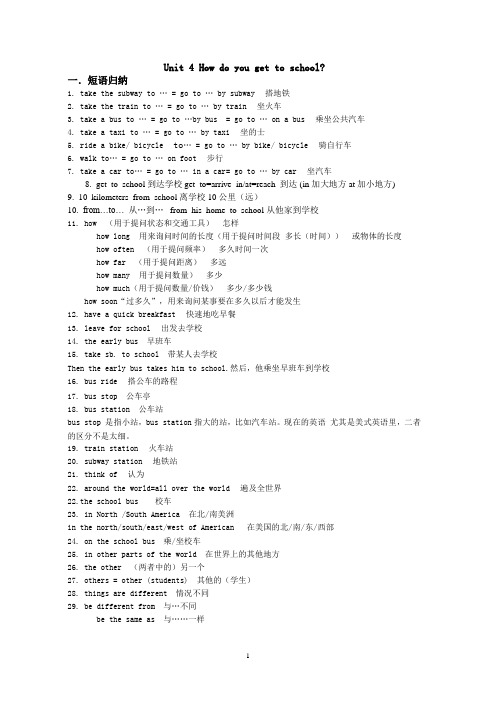
Unit 4 How do you get to school?一.短语归纳1. take the subway to …= go to … by subway搭地铁2. take the train to …= go to … by train坐火车3. take a bus to …= go to …by bus= go to … on a bus乘坐公共汽车4. take a taxi to …= go to … by taxi坐的士5. ride a bike/ bicycle to…= go to … by bike/ bicycle骑自行车6. walk to…= go to … on foot步行7. take a car to…= go to … in a car= go to … by car坐汽车8. get to school到达学校get to=arrive in/at=reach 到达 (in加大地方at加小地方)9. 10 kilometers from school离学校10公里(远)10. from…to…从…到…from his home to school 从他家到学校11. how(用于提问状态和交通工具)怎样how long用来询问时间的长度(用于提问时间段多长(时间))或物体的长度how often(用于提问频率)多久时间一次how far(用于提问距离)多远how many用于提问数量)多少how much(用于提问数量/价钱)多少/多少钱how soon“过多久”,用来询问某事要在多久以后才能发生12. have a quick breakfast快速地吃早餐13. leave for school出发去学校14. the early bus 早班车15. take sb. to school 带某人去学校Then the early bus takes him to school.然后,他乘坐早班车到学校16. bus ride搭公车的路程17. bus stop 公车亭18. bus station 公车站bus stop 是指小站,bus station指大的站,比如汽车站。
新版新目标英语八年级上册知识点总结

U n i t1W h e r e d i d y o u g o o n v a c a t i o n1.go on vacation去度假vacation假期、假日=holiday,on vacation = on holiday 度假the long vacation 长假the summer vacation 暑假 the Christmas vacation 圣诞假期goonvacation/tothemountains/tothebeach/tosummercamp 去度假,去爬山,去沙滩,去夏令营2.buy anything special 买特别的东西1buy v买;购买过去式为bought buysb.sth=buysthforsb. 给某人买某物2anything不定代词,某事;某件东西主要用于疑问句或否定句中Do you want to buy anything for meI can’t say anything about it.3)anthing special特别的东西 adj修饰不定代词时后置4 something,anything,nothing,everything是指物的不定代词;somebody,someone,anybody,anyone, nobody,everybody,everyone是指人的不定代词;somewhere,anywhere,nowhere,everywhere是指地点的不定代词;5 这些不定代词做主语时,谓语动词用第三人称单数 Is everybody here 大家都到齐了吗6 something,somebody,someone,somewhere用于肯定句及表示请求或建议的疑问句中,而anything, anybody,anyone,anywhere用于否定句及疑问句中;Did you do anything interesting 你做了有趣的事吗表疑问3. anywhere adv 在任何地方 Did you go anywhere during the summer vacationanywhere 在任何地方常用于否定句和疑问句中I can’t find it anywhere.somewhere 在某处;到某处常用于肯定句中 I lost my key somewhere near here.4.take photos 照相;拍照5. quite a few 很多;不少修饰可数名词复数quite a little 很多;不少修饰不可数名词afew+可数名词复数表肯定 few+可数名词复数表否定alittle+不数名词表肯定 little+不可数名词表否定6.most of the time大部分时间 most为代词,大部分;大多数most of………中的大多数它作主语时,谓语动词取决于most of后所修饰的名词Most of us are going to the park. 我们大多数人要去公园;Most of the food goes bad. 大部分的食物都变质了;7.have a good time = enjoy oneself = have fun 玩得开心 + doingWe had a good time visiting the the Great Wall.= We enjoyed ourselves visiting the the Great Wall.= We had fun visiting the the Great Wall.8.How did you like it 你觉得它怎么样How do/did you like……你觉得……怎么样用来询问对方的观点或看法,=What do you think of……=How do/did you feel about……9. go shopping去购物;去买东西=do some shopping.go+doing 形式表示去做某事,常用于表达从事某一体育活动或休闲活动go skating 去滑冰 go hiking 去徒步旅行 go sightseeing 去观光go fishing去钓鱼 go swimming 去游泳 go boating 去划船10.a friend’s farm是名词所有格形式;一般情况下,表示“有生命的人或物”的名词后面加’s,表示所属关系;The red bike is Alice’s.那辆红色的自行车是爱丽斯的;名词所有格的构成:1单数名词词尾加’s ,复数名词词尾没有s,也要加’sthe girl ‘s pen女孩的钢笔women’s shoes女鞋on Children’s Day2复数名词以s结尾的只加’the students’ reading room学生阅览室Teachers’ Day教师节3如果两个名词并列,并且分别有’s,则表示“分别有”;只后一个名词有一个’s,则表示“共有”:John’s and Kate’s rooms.约翰和凯特各自的房间;Lily and Lucy’s father. 莉莉和露西的爸爸同一个爸爸;4表示无生命的名词一般以...of...构成短语,表示所有关系;a map of China一幅中国地图 the name of the story那个故事的名字11.seem v 好像;似乎;看来1seem+adj. 看起来…… You seem happy today.你今天看起来很高兴;2seem+to do sth. 似乎,好像做某事I seem to have a cold.我似乎感冒了;=It seems that I have a cold.3)It seems/seemed+从句看起来好像…;似乎…It seems that no one believes you.看起来好像没有人相信你4 seem like 好像,似乎12.nothing much to do 没什么事可做nothing...but... 除....之外什么也没有,只有 but+ n/v原形I have nothing to do but watch TV.Thereisnothingmuchtodobutread.除了读书没什么可做的13. bored boringbored 厌烦的;感到无聊的一般在句中修饰人boring 无聊的;令人厌烦的一般在句中修饰事或物beboredwith对…感到无聊interested adj. 感兴趣的 interesting adj. 有趣的 surprised adj. 感到惊奇的surprising adj. 惊奇的tired 累的 tiring 令人疲惫的 excited 兴奋的 exciting 令人兴奋/激动的amazed 惊讶的 amazing 令人惊讶的14.say about 发表对....的看法enjoyable adj 愉快的;快乐的 enjoy doing sth . 喜欢做…乐意做…enjoy oneself =have a good = have fun 过得愉快15.arrive v 到达 arrive in表示到达较大的地方,如国家、省、市等arrive at表示到达较小的地方,如机场、商店、广场、村庄等;地点副词home,here,there前介词省略arrive in+大地点 / arrive at+小地点②get to +地点③reach+地点16.decide v 决定 n decisiondecide to do sth. 决定做某事 decide not to do sth决定不要做某事decide on doing sth. 决定做某事make a decision to do sth.decidetodosth=makeadecisiontodosth决定做某事decide后常跟疑问词+动词不定式做宾语17.try v 其后常接名词、动名词或不定式,尝试;试图,设法;努力1trytodosth努力做…表示想尽一切办法要把事情办成,强调付出努力设法去完成;2trydoingsth尝试做表示一种尝试、做做看的想法,不一定付出很多努力;3try/doone’sbesttodo尽力做4haveatry试一试 try n 尝试18.feel like给……的感觉;感受到其后常接从句;He feels like he is swimming. 他感觉像在游泳一样;feel like 想要……其后可接名词、代词或动名词;feel like sth. 想要某物 feel like doing sth. 想要做某事19. building n 建筑物;楼房build v建造,建筑built,built,The workers built many tall buildings in our school last year.20.wonder v 想知道;琢磨其后常接who, what, why等疑问词引导的宾语从句;I wonder what they were doing here.我想知道他去哪里了;21.walk around 四处走走He’s just walking around the village.他只是在村庄里随便走走;22.difference n 差别,差异 adj different不同的;有差异的What is the difference between this book and that book My schoolbag is different from yours.1tellthedifferencesbe tween..and…说出…与…的区别2makeadifferenceto对…有影响,有意义3 be different from 与……不同 be the same as23. 常用的感叹句的结构:1What +adj.+ 复数名词 / 不可数名词+主语+谓语2What +a/an+adj.+可数名词单数+主语+谓语3How +adj. +a/an+可数名词单数+主语+谓语4How+adj./adv. +主语+谓语What an interesting book it is = How interesting a book is 那本书多么有趣啊24. want to do sth. =想要做某事 start doing sth. 开始做某事=start to do sth.take the train 乘火车”,take乘坐25.a little 一点儿修饰动词、形容词或副词;也可修饰不可数名词;26. wait for等候其后可接人或物Tom was waiting for a bus over there.27. over prep多于;超过=more than;My father is over 40 years old.There are over eight hundred students in our school.28. too many 太多其后接可数名词复数; He always has too many questions to ask me.too many + 可数名词复数太多...too much + 不可数名词太多...much too + 形容词 /副词太...29. becauseof+宾语名词/动名词/代词因为,由于becauseconj.+句子因为引导状语从句I didn’t buy the shirt because it was too expensive.He lost his job because of his age.30. below 表示下方,低于反义词为 above 在......上面under表示在正下方31. bring 带来;拿来指从别处带到说话者所在地take 拿走;带走指从说话者所在地带到别处去bring sth.to +地点,带来其反义词是takePlease bring your book to our school. 请把你的书带到我们学校来;Please take your book to your school. 请把你的书带到你的学校去;32.enough adj 足够的,充分的修饰adj或adv,一般置于被修饰词之后1enough+n足够多的用来修饰名词时放在名词之前2adj/advenoughtodosth足够…We have enough time to do our homework. The box is big enough.33. forget to do sth.与forget doing sth.forget to do sth. 忘记要做某事事情还没做Don’t forget to close the window.forget doing sth. 意为“忘记做过某事事情已经做过了 I forget closing the window.stoptodo停下来去做另外一件事,stopdoing停下来做某事34.why not为什么不呢一般用在疑问句中,表示提建议;why not后面需跟动词原形;Why not + 动词原形 =Why don’t you+ 动词原形Why not go to the party with me =Why don’t you go to the party with me提建议的句子What/ how about +doing sth. Why don’t you + do sth. Why not + do sth.Let’s + do sth. Shall we/ I + do sth.35. with prep 具有;带有with作介词时的其他用法1“和……一起’ I often go to school ______ my friend. 我经常和朋友们一起去上学;2以手段、材料,用工具, Cut the apple with a knife. 用刀切苹果;36.s o … that 如此…以致于引导结果状语从句,so adv+adj/adv. that+从句She was so sad that she couldn’t say a word. 她悲伤得一句话也说不出来;so that 引导目的状语从句以便,为了so…that…/ such…that…如此…以致引导的结果状语从句so+adj./adv.+that…He is ____lovely a boy____we love him very much.The little boy is so young that he can’t go to school.37. tell sb not to do sth. 告诉某人不要做某事keep doing sth. 继续做某事,一直做某事38. jump up and down in excitement. 兴奋地蹦上蹦下up and down 上上下下;来来回回在句中作状语;They looked me ______ ______ ______. 他们上上下下打量我;He walks______ ______ ______ in the room. 他在房间里来回走动;jump into 跳入 jump off 跳离 jump over 跳过 jump out of 跳出39. comeup太阳出来;出现,发生40. 反身代词:myself , ourselves, yourself , yourselves, himself, herself, itself, themselves.作动词或介词的宾语:经常在enjoy, teach, hurt, buy, introduce, dress, kill等动词和by, for, to, of等介词后作宾语;一年主考宾语回自身He is teaching himself English.她在自学英语;talk to oneself自言自语 live by oneself独自住 Help yourself 请随便吃吧/请自己去取吧Make yourself at home 别客气 make yourself heard /understood. 使你的话被人听得见/理解 teach oneself 自学=learn by oneself by oneself 独自for oneself 为自己;替自己 enjoy oneself 玩的愉快 dress oneself 给自己穿衣41. onthetopof在…的上面 takeanumbrellawithsth随身携带一把伞longtimenosee好久不见 inthecountryside在农村keepadiary记日记 enjoydoing享受做… walkuptosp.往上走到某地rideabiketosp.=gotosp.onthebike=gotosp.bybike骑自行车去某地rainhard/heavily雨下得大 abowof一碗42. taste good 尝起来好吃系动词+adjkeep保持stay保持seem好像look看来像smell闻起来sound听起来taste尝起来feel摸起来。
(简化版)人教版新目标八年级上册英语知识点全册

(简化版)人教版新目标八年级上册英语知识点全册人教版新目标八年级上册英语知识点全册(简化版)单元一:School life- 介绍学校的科目、教室和其他相关信息。
- 研究表达时间和日常活动。
- 研究如何询问和回答有关日常活动和时间的问题。
单元二:Hobbies- 研究谈论个人的爱好和兴趣。
- 研究使用动词的-ing形式。
- 研究询问和回答有关爱好的问题。
单元三:At the weekend- 研究谈论周末的活动和计划。
- 研究使用情态动词can和could表达能力和请求。
- 研究询问和回答有关周末计划的问题。
单元四:My town- 研究描述自己所在的城镇或城市。
- 研究使用介词in, on, at描述地点。
- 研究询问和回答有关地点的问题。
单元五:Health and fitness- 研究谈论健康和健身。
- 研究使用情态动词should表达建议。
- 研究询问和回答有关健康和健身的问题。
单元六:Festivals- 研究谈论各种节日和庆祝活动。
- 研究使用一般现在时描述节日活动。
- 研究询问和回答有关节日和庆祝活动的问题。
单元七:Clothes- 研究谈论衣服和购物。
- 研究使用形容词描述衣服。
- 研究询问和回答有关衣服和购物的问题。
单元八:Inventors and inventions- 研究谈论发明家和发明物。
- 研究使用被动语态描述发明物。
- 研究询问和回答有关发明家和发明物的问题。
单元九:Heroes- 研究谈论英雄和英雄的品质。
- 研究使用情态动词may和might表达推测。
- 研究询问和回答有关英雄的问题。
单元十:Customs and traditions- 研究谈论各种俗和传统。
- 研究使用一般过去时描述过去的俗。
- 研究询问和回答有关俗和传统的问题。
单元十一:World records- 研究谈论世界纪录和成就。
- 研究使用比较级和最高级形容词来描述事物。
- 研究询问和回答有关世界纪录和成就的问题。
新版新目标英语八年级上册知识点总结

新版新目标英语八年级上册知识点总结Unit7 Will people have robortsSection A1.一般将来时(1)概念: 一般将来时是表示将来某个时间将要发生的动作或存在的状态。
I am going to / shall watch a football match on TV this evening. 今天晚上我将看一场足球比赛。
(2)结构①肯定式:主语 + 助动词will/shall + 动词原形 + 其他(wil用于各种人称,shall用于第一人称)=主语 + be going to + 动词原形 + 其他will表示单纯将来概念,be going to强调事先经过考虑安排而计划或打算要做某事(意图) Are you going to post that letter由某种迹象判断某事有可能发生(预见) It’s going to rain.②否定式:在will/shall/be 后面加 not. will not = won’t③一般疑问句:将will/shall/be 提到主语前面。
be 某地有某物它有不同时态。
(1) 过去时态:There was/ were…. 表某地过去有某物(2) 现在时态:There is/ are …. 表某地现在有某物(3) 将来时态:There will be …= There is/are going to be…表某地将有某物(4)句式①一般疑问句形式:Will there be + 主语 + 其他。
②肯定回答:Yes, there will. 否定回答是:No, there won’t.③否定形式:There won’t be + 主语 + 其他,将不会有……④特殊疑问句: 疑问词/ 词组 + 一般疑问句When will there be a nice match何时会有一场精彩的球赛(6) there be句型中不能用have\has(7) there be 表示某地存在某物强调的是客观存在着的东西。
人教版新目标八年级英语上册1-5单元知识点总结

新目标八年级英语上册第一单元Unit 1.How often do you exercise?I. 重点短语归纳:on weekends 在周末1. go to the movies 去看电影2. look after=take care of 照顾3. surf the internet 上网4. healthy lifestyle 健康的生活方式5. go skateboarding 去滑滑板watch TV看电视6. keep healthy=stay healthy = keep in good health 保持健康keep + 形容词表保持某种状态do some reading 阅读7. exercise= take/do (much) exercise=do sports锻炼8. eating habits 饮食习惯9. take more exercise 做更多的运动10. the same as 与什么相同11. once a month一月一次12. be different from 不同13. twice a week一周两次.three tim es a week一周三次14. make a difference to 对….有影响As teachers, you must believe that you can make a difference to the lives of your students. 身为教师,你们必须坚信你们能够影响学生的一生。
A false step will make a great difference to my future.错走一步对我的前程来说会产生很大影响。
15. how often 多久一次,询问动作发生的频率how many times 多少次,用来提问做某事的次数16. although=though虽然 <不能与but连用>Although he is old, he is quite strong.(He is old, but he is quite strong.)句子中,有although或though就不可再用but,但可用yet或still“仍然,还”;有because就不能再用so.17. as for至于18. activity survey活动调查19. do homework做家庭作业20. do house work 做家务事23. eat less meat吃更少的肉24. junk food垃圾食物25. be good for 对什么有益26. be bad for对什么有害27. want to do sth 想做某事28. want sb to do sth想某人做某事29. try to do sth 尽量做某事30. come home from school放学回家31. of course=certainly=sure当然32. get good grades取得好成绩33. some advice 一些建议some advice 中的advice 是不可数名词 a piece of advice 一则建议give advice 提出建议take one’s advice 采纳或听从某人的建议4. help sb to do sth帮助某人做某事=help sb with sth35. a lot of vegetables=many vegetables许多蔬菜36. hardly= almost not几乎不 hardly ever很少,几乎不,从不37. keep/be in good health保持健康38. your favorite program你最喜欢的节目39. Animal World 动物世界40. play soccer踢足球41.every day 每天every day 与 everyday1. every day 作状语,译为“每一天”。
新目标英语八年级上册1至6单元知识点总结

八年级上册1-6单元知识点总结第一单元一、应掌握的单词:1、exercise既可以做名词,也可以做动词,表示“锻炼,运动”时,是不可数名词,表示“练习,体操”时,是可数名词。
2、skateboard【动词】意为“踩滑板;参加滑板运动”,skate【动词】意为“滑冰;溜冰”,board【名词】意为“板”。
3、hardly=almost not 几乎不几乎不 4、active【形容词】意为“活跃的;积极的”,它的名词形式是activity.5、about=around大约大约 6、of course= sure=certainly当然当然 7、look after=take care of 照顾照顾 8、different【形容词】意为“不同的;有区别的” ,它的名词形式是difference.9、although=though虽然虽然 10、a lot of=lots of后面跟可数名词的复数或不可数名词。
11、must【情态动词】意为“必须”,后面跟动词原形,相当于have to.12、less【形容词】意为“较小的;更小的;较少的;更少的”,它是little的比较级。
的比较级。
二、应掌握的词组:1. go to the movies 去看电影去看电影2. watch TV看电视看电视3. surf the internet 上网上网 ,上网冲浪,上网冲浪 4.read English books读英语书读英语书5.do homework做家庭作业做家庭作业(do housework做家务事)做家务事)6.all students所有的学生100%7.most students大多数学生51-99% (= most of the students)8.some students 一些学生1-50%9.no students没有学生0%10.as for至于至于11. be good for 对什么有益对什么有益(be bad for对什么有害)对什么有害)12. come home from school放学回家放学回家 13. eating habits 饮食习惯饮食习惯饮食习惯14.pretty good非常好,不错非常好,不错15. junk food垃圾食物垃圾食物16. healthy lifestyle 健康的生活方式健康的生活方式健康的生活方式 17.kind of=a little=a little bit有点有点 18. help sb to do sth帮助某人做某事,帮助某人做某事, =help sb with sth 19. go skateboarding 去划板去划板去划板20. keep healthy=stay healthy 保持健康21. exercise=take (much) exercise=do sports锻炼锻炼22. take more exercise 做更多的运动做更多的运动 23. the same as 与什么相同与什么相同24. once a month一月一次一月一次25. be different from 不同不同26. twice a week一周两次一周两次一周两次27. make a difference to 对什么有影响对什么有影响 28. how often 多久一次多久一次多久一次29. shop=go shopping=do some shopping 购物购物30. activity survey活动调查活动调查31. eat less meat吃更少的肉吃更少的肉32. want to do sth 想做某事想做某事33. want sb to do sth想要某人做某事想要某人做某事 34. get good grades取得好成绩取得好成绩取得好成绩35. a lot of vegetables=many vegetables许多蔬菜许多蔬菜36. keep/be in good health保持健康保持健康三、 应掌握的句子:1.How often do you watch TV? 你多久看一次电视?你多久看一次电视?How often + 助动词(助动词(do 或does) + 主语主语 + do sth.?这个句型是用来提问在某一特定这个句型是用来提问在某一特定的时间里进行某个动作的次数,即“多久一次”。
(完整)新目标八年级上册英语语法知识点精讲+练习,推荐文档
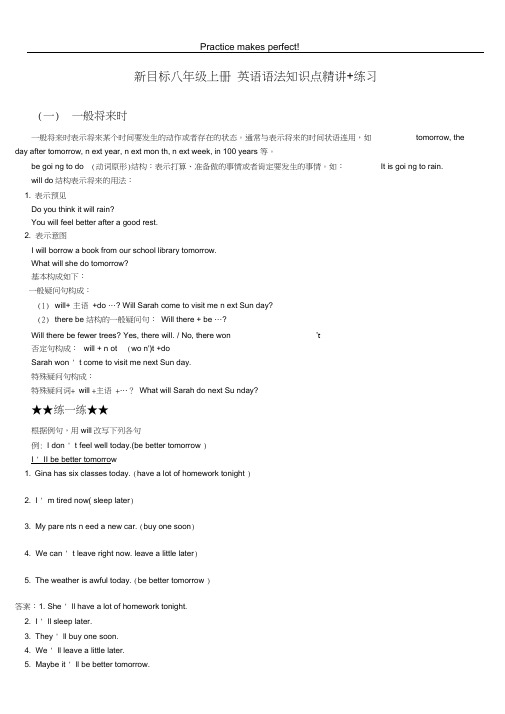
新目标八年级上册英语语法知识点精讲+练习(一)一般将来时一般将来时表示将来某个时间要发生的动作或者存在的状态。
通常与表示将来的时间状语连用,如tomorrow, the day after tomorrow, n ext year, n ext mon th, n ext week, in 100 years 等。
be goi ng to do (动词原形)结构:表示打算、准备做的事情或者肯定要发生的事情。
如:It is goi ng to rain.will do结构表示将来的用法:1. 表示预见Do you think it will rain?You will feel better after a good rest.2. 表示意图I will borrow a book from our school library tomorrow.What will she do tomorrow?基本构成如下:一般疑问句构成:(1)will+ 主语+do …? Will Sarah come to visit me n ext Sun day?(2)there be 结构的一般疑问句:Will there + be …?Will there be fewer trees? Yes, there will. / No, there won 't否定句构成:will + n ot (wo n')t +doSarah won ' t come to visit me next Sun day.特殊疑问句构成:特殊疑问词+ will +主语+…?What will Sarah do next Su nday?★★练一练★★根据例句,用will改写下列各句例: I don ' t feel well today.(be better tomorrow )I ' II be better tomorrow1. Gina has six classes today. (have a lot of homework tonight )2. I ' m tired now( sleep later)3. My pare nts n eed a new car. (buy one soon)4. We can ' t leave right now. leave a little later)5. The weather is awful today. (be better tomorrow )答案:1. She ' ll have a lot of homework tonight.2. I ' ll sleep later.3. They ' ll buy one soon.4. We ' ll leave a little later.5. Maybe it ' ll be better tomorrow.(二)should 的用法:should用来提出建议和忠告,后边加动词原形,否定句直接在should后边加not.例如:I think you should eat less junk food.我认为你应该少吃垃圾食品。
人教新目标英语八年级上册unit1-Unit4单元重点知识复习
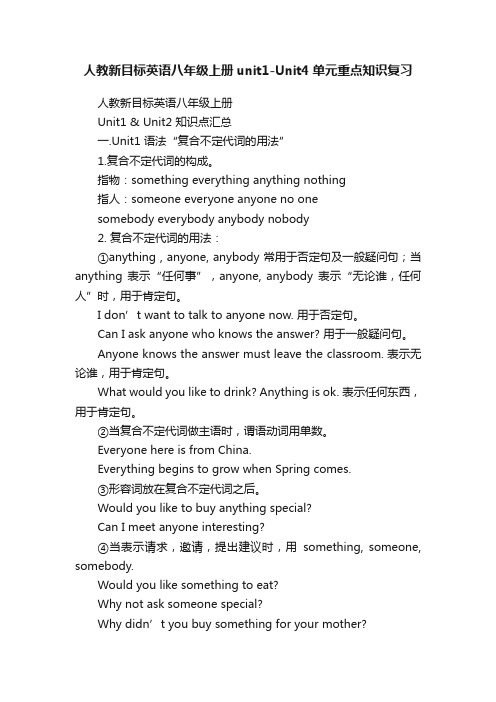
人教新目标英语八年级上册unit1-Unit4单元重点知识复习人教新目标英语八年级上册Unit1 & Unit2 知识点汇总一.Unit1 语法“复合不定代词的用法”1.复合不定代词的构成。
指物:something everything anything nothing指人:someone everyone anyone no onesomebody everybody anybody nobody2. 复合不定代词的用法:①anything , anyone, anybody 常用于否定句及一般疑问句;当anything 表示“任何事”,anyone, anybody 表示“无论谁,任何人”时,用于肯定句。
I don’t want to talk to anyone now. 用于否定句。
Can I ask anyone who knows the answer? 用于一般疑问句。
Anyone knows the answer must leave the classroom. 表示无论谁,用于肯定句。
What would you like to drink? Anything is ok. 表示任何东西,用于肯定句。
②当复合不定代词做主语时,谓语动词用单数。
Everyone here is from China.Everything begins to grow when Spring comes.③形容词放在复合不定代词之后。
Would you like to buy anything special?Can I meet anyone interesting?④当表示请求,邀请,提出建议时,用something, someone, somebody.Would you like something to eat?Why not ask someone special?Why didn’t you buy something for your mother?Unit2 语法“频率副词”How often 常用于对频率的提问,意为“多长时间一次”,其答语可以是once/ twice / three times a week; always/ usually/ often/ sometimes/ hardly ever/ never 等表示时间频率的副词及短语。
人教版新目标八年级英语上册Unit 9讲义及重点总结
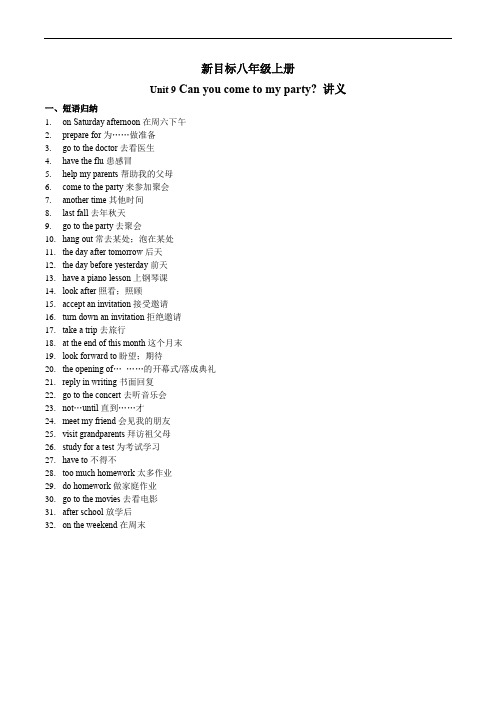
新目标八年级上册Unit 9 Can you come to my party? 讲义一、短语归纳1.on Saturday afternoon在周六下午2.prepare for为……做准备3.go to the doctor去看医生4.have the flu患感冒5.help my parents帮助我的父母e to the party来参加聚会7.another time其他时间st fall去年秋天9.go to the party去聚会10.hang out常去某处;泡在某处11.the day after tomorrow后天12.the day before yesterday前天13.have a piano lesson上钢琴课14.look after照看;照顾15.accept an invitation接受邀请16.turn down an invitation拒绝邀请17.take a trip去旅行18.at the end of this month这个月末19.look forward to盼望;期待20.the opening of………的开幕式/落成典礼21.reply in writing书面回复22.go to the concert去听音乐会23.not…until直到……才24.meet my friend会见我的朋友25.visit grandparents拜访祖父母26.study for a test为考试学习27.have to不得不28.too much homework太多作业29.do homework做家庭作业30.go to the movies去看电影31.after school放学后32.on the weekend在周末二、句型荟萃1. invite sb. to do sth. 邀请某人做某事2. what引导的感叹句结构:What+a/an+adj.+可数名词单数(+主语+谓语)!3. What+adj.+名词复数/不可数名词(+主语+谓语)!4. help sb.(to)do sth.帮助某人做某事5. be sad to do sth.做某事很悲伤6. see sb. do sth. see sb.doing sth.7. the best way to do sth.做某事最好的方式8. have a surprise party for sb.为某人举办一个惊喜派对9. look forward to doing sth.期盼做某事10. reply to sth./sb.答复某事/某人11. What’s today?今天是什么日子?What’s the date today? What day is it today?三、重难点知识讲解1. Can you come to my party on Saturday afternoon?in:用在上午下午晚上,在月份、季节和年之前;on用在星期、日期、节日和特定的某一天前。
人教新目标英语八年级上册unit1重点短语和句子归纳总结

人教新目标英语八年级上册Unit1 Where did you go on vacation 重点短语1.visited museums 参观博物馆2.went to summer camp/ the mountains 去夏令营/爬山3.stayed at home 呆在家4.go on vacation 度假5.study for tests 准备考试6.meet anyone interesting 遇见有趣的人7.do/ Buy anything special做\ 买特别的东西8.anywhere interesting 有趣的地方9.take quite a few photos照很多照片10.most of the time 大多数时候11.taste really good/ great.尝起来真好极了12.buy something for somebody= buy somebodysomething 为某人买某物13.in the countryside在农村14.at a restaurant在饭店15.keep a diary写日记16.arrive in / at= get to = reach 到达….17.decide to do something 决定做……18.near our hotel在我们的宾馆附近19.try paragliding ( try doing something) 尝试滑翔(尝试做….)20.feel like doing something 感到喜欢做……,好像……21.ride bicycles to Georgetown 骑自行车到了Georgetown22. a lot of new buildings 许多新建筑23.many of the old buildings许多老建筑24.Chinese traders from 100 years ago 100年前的中国商人25.enjoy walking around the town 喜欢在市里漫步26.walk up to the top of the hill步行上山顶27.start raining a little 开始下小雨28.take the train乘火车29.waited over an hour for the train 等了两个多小时的火车30.enough money 足够的钱31.old enough足够老32.another two hours 另外两个小时33. a bag with some food and water装有食物和水的口袋34.so… that…如此……以至于……35.keep going继续走36.go on继续37.jump up and down跳上跳下38.in excitement兴奋地39.twenty minutes later20分钟以后40.bring an umbrella带雨伞41.home cooking家常菜重点句子42.It was my first time there.这是我第一次到那儿。
- 1、下载文档前请自行甄别文档内容的完整性,平台不提供额外的编辑、内容补充、找答案等附加服务。
- 2、"仅部分预览"的文档,不可在线预览部分如存在完整性等问题,可反馈申请退款(可完整预览的文档不适用该条件!)。
- 3、如文档侵犯您的权益,请联系客服反馈,我们会尽快为您处理(人工客服工作时间:9:00-18:30)。
Unit7 Will people have robortsSection A1.一般将来时(1)概念: 一般将来时是表示将来某个时间将要发生的动作或存在的状态。
I am going to / shall watch a football match on TV this evening. 今天晚上我将看一场足球比赛。
(2)结构①肯定式:主语 + 助动词will/shall + 动词原形 + 其他(wil用于各种人称,shall用于第一人称)=主语 + be going to + 动词原形 + 其他will表示单纯将来概念,be going to强调事先经过考虑安排而计划或打算要做某事(意图) Are you going to post that letter由某种迹象判断某事有可能发生(预见) It’s going to rain.②否定式:在will/shall/be 后面加 not. will not = won’t③一般疑问句:将will/shall/be 提到主语前面。
be 某地有某物它有不同时态。
(1) 过去时态:There was/ were…. 表某地过去有某物(2) 现在时态:There is/ are …. 表某地现在有某物(3) 将来时态:There will be …= There is/are going to be…表某地将有某物(4)句式①一般疑问句形式:Will there be + 主语 + 其他。
②肯定回答:Yes, there will. 否定回答是:No, there won’t.③否定形式:There won’t be + 主语 + 其他,将不会有……④特殊疑问句: 疑问词/ 词组 + 一般疑问句When will there be a nice match何时会有一场精彩的球赛(6) there be句型中不能用have\has(7) there be 表示某地存在某物强调的是客观存在着的东西。
have/has 表示某人有某物,强调所属关系。
主观上拥有某物。
二者有时候可以互换(8)There be 句型中的动词be 应该遵守就近原则。
every 但二者含义及语法功能不同(1) each adj pron adv 在句中作定语,主语、宾语、同位语、状语等Each student has his own dictionary.(adj,定语)Each has his good point . (pron,主语)Our headteacher had a talk with each of us . (pron,宾语)The students each have a desk . (pron,同位语,不影响谓语动词的单复数)The children can have a bag each . (adv,状语)(2)each与every都可用作adj,在句中作定语每一个each 指两个或两个以上的人或事物中的“每个”, 强调个人或个别every是指许多人或事物的全体(三者或者三者以上),与all意思相近, 强调全体或全部, 不能单独使用I know each member of your family . 我认识你们家的每个成员。
I know every member of your family . 我认识你们家的每个成员。
(3)each 单独作主语或each、every修饰的单数名词作主语时,谓语动词为单数形式,但each of them作主语时,谓语动词用单数或复数形式都可以。
Each / Each person / Every person is living a happy life now . 人人都过着幸福生活。
Each of them are / is wearing full dress . 他们个个都身着盛装。
(4)every可与not连用构成部分否定,并不/非人人each不可以与not连用。
全部否定是no one,个个都不、没有人等Each / Everyone / Every one of them doesn’t like the TV play . 并非人人都喜欢电视剧部分否定No one likes the TV play . 完全否定(5)表示每隔……、每……,要用every+基数词+复数名词。
every不能用each替代。
They’ll choose one out of every ten girls . We hand in our homework every three days .4. after与in的用法区别in +时间段与将来时连用以现在的时间为起点,多久之后in +时间短语一般用how soon提问,要过多久以后,要到什么时候after +时间段与过去时连用以过去或将来某个时间为起点,将过多久after +时间点可与将来时连用 He will be back after two o'clock.He will be back in two hours. He came back after two hours.5.(1) fewer 更少的 few的比较级,修饰可数名词复数(2) less 更少的 little的比较级,修饰不可数名词(3) more 更多的 many much的比较级,修饰复数/不可数名词6. pollution n. 污染,污染物(不可数名词) air pollution空气污染 noise pollution pollute v. (使)污染 pollute the seapolluted adj. 被污染的 polluted water被污染的水7. What will the future be like 未来将会是什么样子What’s sb… like 某人怎么样(询问相貌性格品质)be like 像(多方面像) ook like 看上去像(外表方面像)8. in danger 处于危险之中 out of danger 脱离危险9. 主语为人的有spend和pay;主语为物的有cost;主语常为“it”的有take.(1) spend表“某人花费时间或金钱做某事/在某事上”,用于:Sb spend some money/ time (in) doing sth. 或 Sb spend some money/ time on sth(2) pay常表“某人花钱买某物”。
用于:Sb. pay some money for sth.(3) cost 常表“某物花费某人某些钱”,用于:Sth. cost sb. some money.(4) take尤指“做某事花费某人某些时间”, 常用于:It takes sb some time to do sth10.on the earth在地球上地点状语句首句尾on earth 究竟,到底用于疑问代词或副词后,加强语气Section B1. human 人,人类,有别于动物,自然景物,机器等特殊群体;也可指具体的人。
He was the only human on the island. 他是岛上唯一的人类。
person 无性别之分,常用于数目不太大而且数目比较确定的场合 three personspeople 泛指人们,表示复数概念。
many peopleman前不带冠词而且单独使用时,指男人,a man 可指一个人/ 一个男人,复数形式为men.Man is stronger than woman.2. help (sb) with sth. 在某方面帮助某人3. There is/ are sb. doing sth. 某地有某人/某物正在做某事There are already robots in factories. (work )有机器人正在工厂工作。
There are several factories waste water into the river. (pour)4. do simple jobs over and over again 反复地做一些简单的工作5. get bored 变厌倦( + ed描述人; +ing描述事物)Fewer people will do such jobs in the future because they are _________, but robots will never get _________.6. do the same things as we do 跟我们做相同的事情7. be able to do sth. 能做某事经过努力而成功做成某事有人称和数的变化can 没有人称和数的变化现在式和过去式表示请求允许推测能力8. wake up 醒来 wake sb. up 叫醒某人代词必须放在中间9.agree with sb. 同意某人 disagree with sb. 不同意某人数词百 hundreds of 许多大量数百的数以百计的(1)当这类数词前面有具体的数字时, 数词不能用复数形式:three hundred students 三百学生, five thousand五千, a few hundred 几百。
(2)当数词前没有具体数字时, 数词用复数形式,后面接短语, 再加可数名词的复数形式hundreds of students 数百名学生thousand, million与其用法相同11.talk 谈话,对话(1)talk to...跟……谈话(对话)(2) talk of...谈到;谈起 We often talk of you. 我们常常谈到你。
(3)talk about...谈论某人或某事 What are you talking about 你们在谈论什么(4)talk with...同……交谈 He is talking with a friend. 他在和一个朋友谈话。
12. seem v 好像,似乎,看来看似, 连系动词(1) seem + to do sth似乎/看起来/好像做某事 He seems to think so. 他似乎认为如此。
(2) It seems/seemed that 看来…… It seems that he is lying. 看来他在撒谎。
(3) seem + n./adj 好像是,似乎是He seems an honest boy. 看上去他像是个诚实的孩子。
He seems a nice man.(4) seem like 好像,似乎 It seemed like a good idea at the time.(5) seem to be + 形容词/名词 = seem + 形容词/名词She seems to be happy.= She seems happy=She was very happy.13. during 介词在....期间during 某事是在某一段时间之间发生for 某事持续多久则in 某事具体发生的时间14. probably ad. maybe 相当于 perhaps. 也许,大概,可能作状语.probably 句中,可能性最大 He will probably come tomorrow.maybe/perhaps 句首 Maybe/Perhaps you are right.。
